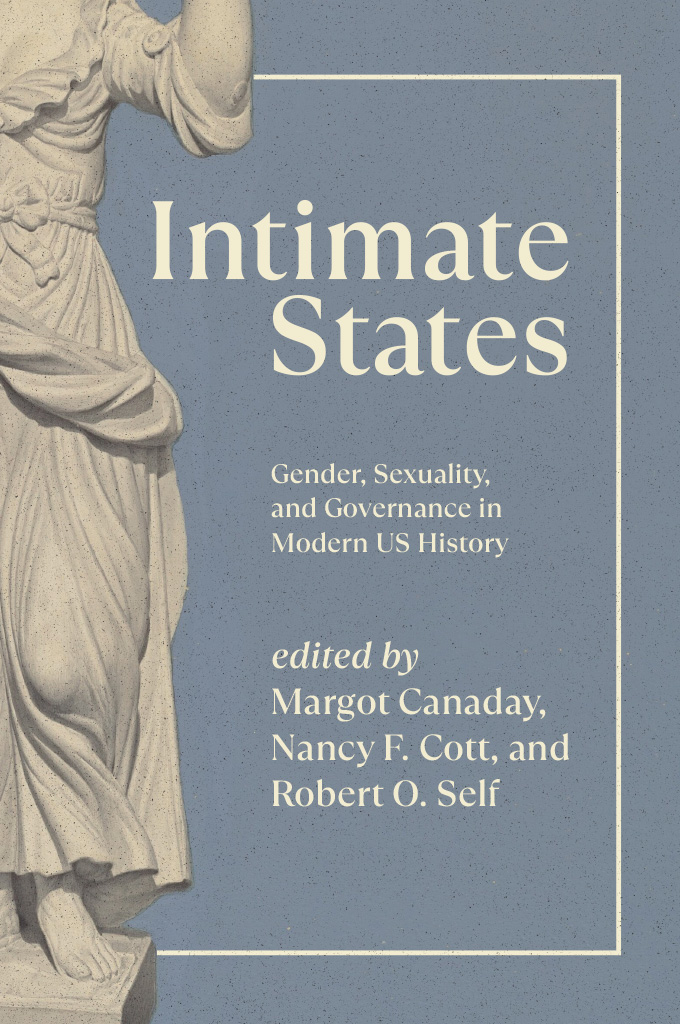
Intimate States
Intimate States
Gender, Sexuality, and Governance in Modern US History
Edited by Margot Canaday, Nancy F. Cott, and Robert O. Self
The University of Chicago Press
CHICAGO & LONDON
The University of Chicago Press, Chicago 60637
The University of Chicago Press, Ltd., London
2021 by The University of Chicago
All rights reserved. No part of this book may be used or reproduced in any manner whatsoever without written permission, except in the case of brief quotations in critical articles and reviews. For more information, contact the University of Chicago Press, 1427 E. 60th St., Chicago, IL 60637.
Published 2021
Printed in the United States of America
30 29 28 27 26 25 24 23 22 21 1 2 3 4 5
ISBN-13: 978-0-226-79461-7 (cloth)
ISBN-13: 978-0-226-79475-4 (paper)
ISBN-13: 978-0-226-79489-1 (e-book)
DOI: https://doi.org/10.7208/chicago/9780226794891.001.0001
Library of Congress Cataloging-in-Publication Data
Names: Canaday, Margot, author. | Cott, Nancy F., author. | Self, Robert O., 1968 author.
Title: Intimate states : gender, sexuality, and governance in modern US history / edited by Margot Canaday, Nancy F. Cott, and Robert O. Self.
Description: Chicago : University of Chicago Press, 2021. | Includes bibliographical references and index.
Identifiers: LCCN 2020053633 | ISBN 9780226794617 (cloth) | ISBN 9780226794754 (paperback) | ISBN 9780226794891 (ebook)
Subjects: LCSH: MarriagePolitical aspectsUnited States. | SexPolitical aspectsUnited States. | ReproductionPolitical aspectsUnited States. | FamiliesPolitical aspectsUnited States.
Classification: LCC HQ535 .I585 2021 | DDC 306.810973dc23
LC record available at https://lccn.loc.gov/2020053633
 This paper meets the requirements of ANSI / NISO Z39.48-1992 (Permanence of Paper).
This paper meets the requirements of ANSI / NISO Z39.48-1992 (Permanence of Paper).
Contents
Margot Canaday, Nancy F. Cott, and Robert O. Self
Stephanie McCurry
Jeffrey Escoffier, Whitney Strub, and Jeffrey Patrick Colgan
William J. Novak
Grace Pea Delgado
Susan J. Pearson
Tera Eva Agyepong
Molly Ladd-Taylor
Anne Gray Fischer
Regina Kunzel
Timothy Stewart-Winter
Serena Mayeri
Stephen Vider
Johanna Schoen
Paisley Currah
Brent Cebul
Margot Canaday, Nancy F. Cott, and Robert O. Self
Intimacy and state power may appear to be far apart. The close ties and living arrangements of intimate life seem to inhabit a realm of their own, and the laws, treaties, and bureaucracies of the state another. This book works against the grain of such assumptions, beginning instead with the proposition that state practices inhere in life events that we think of as very personal. We aim to show that what we call intimate governance is central to the social and political history of the modern United States. The new essays in this volume bring questions about statecraft into explorations of the history of intimate life, urging readers to see with fresh eyes and sharper focus something they may have missed: that the realm of the intimate is ideal terrain for historians of the state.
Once we bring governance and intimacy together analytically, we can see this. We can see that household economic and sexual relations have been scripted by laws structuring what is public and private. It follows that state operations from the past into the present cannot be fully understood without looking into conduct as intimate as sex. Sexuality, marriage, and reproductionour most private expressions of selfare bound up in a vast legal architecture meant to support what is seen as public order and the public good. Viewed from this perspective, both intimacy and state power acquire a fresh look. Our intimacies emerge as ordered and obligated as well as personal and willful. State power becomes intelligible as diffuse and social, as much as hierarchical and bureaucratic. Its effects, as they are absorbed into ordinary lives, become at times indistinguishable from society itself.
Precedents for this books endeavor date from the late 1970s, when new scholarly attention to women put pressure on the presumed boundary between public and private, exploding the notion that intimate life was divorced from the market or from politics.
This neglect of gender and sexuality by historians of the statedespite the way that those fields of social life are organically dense with state-society connectionsmay reflect in part a problem of scale. Historians thinking about statecraft have generally turned away from the scale of the intimate even as they have abandoned models of the state that stress its centralized power. The bigger, the better, Suleiman Osman writes drily of this tendency, noting that for many such historians, larger scales appear[ed]... more real... as well as more powerful and just.
If life at an intimate scale were in the foreground of historical thinking about state power in the United States, what would be the result? The analysis would query less what the state is than what it does, by examining diverse state operations and effects. It would thereby resist disputes that have preoccupied generations of historians and political scientists, about the American state being weak or strong, big or small, exceptional or not among Western nations. The emerging picture would complement historians recent theorizing that has sidelined the typological questionhow to characterize exactly what the state is. Rather than assessing weakness or strength, emphasis on intimate life would lead to highlighting the ways that state power has been shared and divided among the national government and the states and localities. Federalism, in other words, would appear front and center, as historians of intimate governance in the United States pursue the changing dispersion of power among local, state, and federal levels of authority over time, and chart the ways federalism itself was reconstituted in creating modes of reaching into intimate life.
One dimension of federalism in particular would become far more visible to historians if intimate governance were foregrounded: what is called the police power, a power over social life both immense and diffuse. The meaning of police in that phrase is easy to mistake now; it is an archaic usage, closer to todays word policy than to a synonym for cop. The police power is the authority to create and maintain a harmonious public order, intended to benefit community welfare without trampling unduly on individual freedoms (though necessarily restricting them somewhat). And it lies in the hands of local and state authorities, not the federal government. Since the US Constitution never mentioned the police power, by means of the Tenth Amendment it rested with the several states.
Too often neglected in comparison with state power to construct markets and regulate the economy, conduct foreign affairs, or make war, the police power is the foundation of intimate governance. It covers a vast array of human activity, from land use to sexual regulation, enabling state actions to press into the intimate scale to construct a public order linking the maintenance and health of the polity to the intimacies of marriage, family, and sexuality. Constitutionally licensed to do so, states or their chartered county and city subordinates regulated those intimate domains through much of the nineteenth century, while also administering schools, poor laws, public roads, and myriad other components of social and economic activity. The scale of the intimate allows us to see all this better, much like examining something under a microscope.
Next page
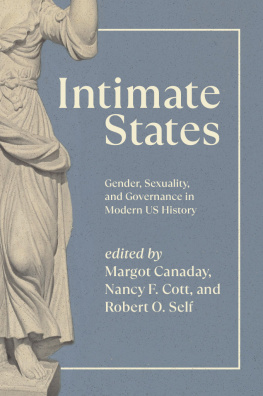

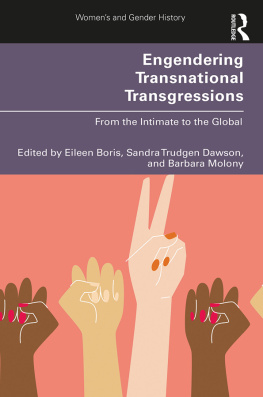
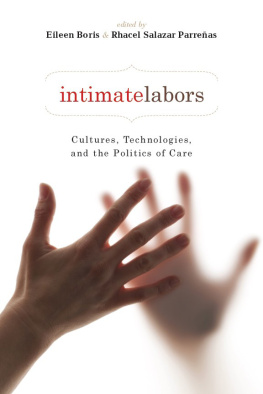
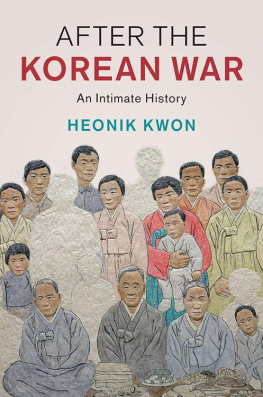
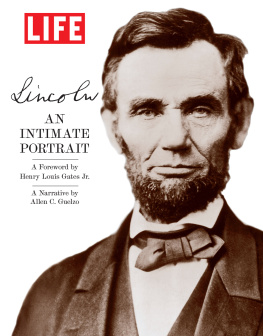
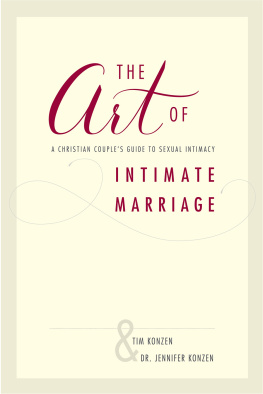
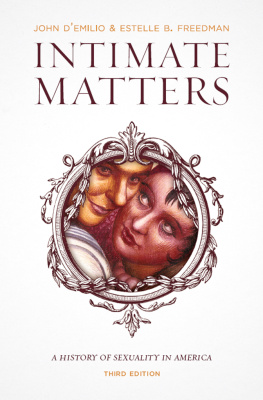

 This paper meets the requirements of ANSI / NISO Z39.48-1992 (Permanence of Paper).
This paper meets the requirements of ANSI / NISO Z39.48-1992 (Permanence of Paper).